Dynamic Mobile Sensing Platform

Developing a mobile real-time sensing paradigm and framework for the optimal management of transport infrastructure
Developed societies of today are faced with the opportunities and challenges that stem from radical technological development and rapid growth. An undesirable but often inevitable result is the system’s shift from its point of equilibrium, which recovery is often made more challenging due to the high degree of coupling within high-density urban systems.
The “Dynamic Mobile Sensing Platform” research module aims to enable distributed cognition in order to prevent or react to disruption of infrastructure components. Herein, we aim to establish a new sensing paradigm that is mobile and that transmits diverse information in real time. By exploiting the availability of satellite data and roving sensors, urban networks can be transformed into autonomous sensing agents.
The novelty of this research lies in exploiting the passive information aggregated via the Dynamic Mobile Sensing Platform for the benefit of the user. Herein, users are perceived as active nodes that are capable of making decisions and taking action. These users are classified into two distinct user classes: individual network users who navigate through the system during disruptions; and public authorities, operators, and response crew who are responsible for making decisions for the effective operation and maintenance of affected infrastructure components.
The strength and driving force of the research lies in the dynamic and spatially and temporally distributed approach to data collection, which creates both an opportunity and a challenge.

Expected outcomes
A methodological framework will be established to assess the condition of transport infrastructure using data derived from passive sensors of the Dynamic Mobile Sensing Platform. To improve infrastructure resilience, real-time diagnostic indices will be developed to detect disruptions and irregularities due to natural hazards (short-term) or slow deterioration processes (long-term).
Based on a rail or road network as a case study, the team will develop a DMSP-driven reliability assessment framework to enable rapid response in the context of transport infrastructure in Singapore and/or Switzerland. The goal is to deliver a tool to support infrastructure users and guide public bodies in the optimal management of their infrastructural assets.
